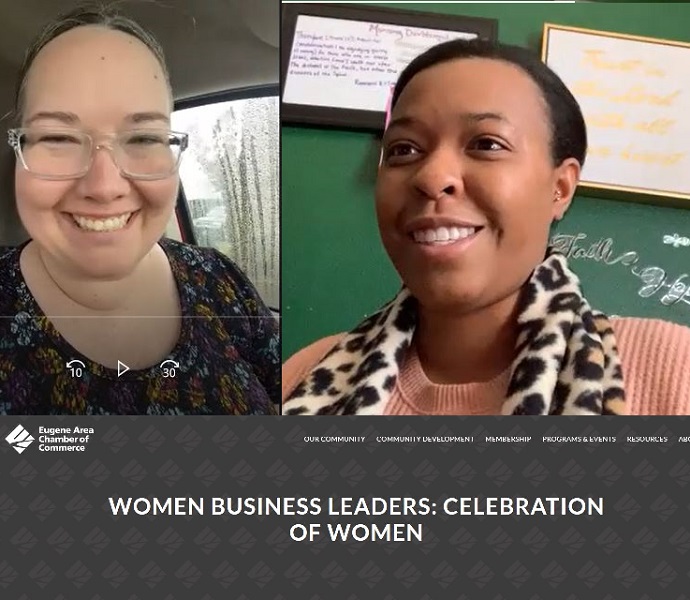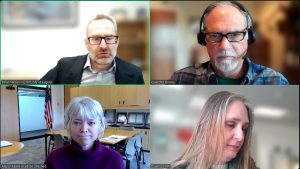Faith Leaders on the Front Lines: Create a safe space to help treat substance abuse
6 min read
Shaunta Hemingway speaks with Sarah Koski about the need to create safe spaces for those dealing with substance abuse and addiction issues.
With Faith Leaders on the Front Lines, Sarah Koski.
[00:00:03] Sarah Koski: This is Faith Leaders on the Front Lines, and I wanted to bring on someone really, really special and close to my heart, Shaunta Hemingway. She has a Master’s in Behavioral Health and Addiction Recovery now working at PeaceHealth.
[00:00:18] Shaunta, I know you just have a heart and a passion for the community. And the work that you’re doing with youth and those that are coming in to your office, or even on Zoom, it’s just an absolute blessing. It’s so much healing. And that’s why I think Faith Leaders On The Front Lines is so important is because you don’t have to be a pastor or a Bible study leader to practice your faith.
[00:00:41] And right now is it’s, like you said, it’s such a critical time for so many of us. What type of coping mechanisms have you seen work really good in just our hurting vulnerable community?
[00:00:51] Shaunta Hemingway: I think really just having that safe space is one of the biggest things. There was a conversation that was had even with openness around substance use and our kids having access to doing like groups via zoom or in person. So having support systems in place.
Thank you for supporting
local citizen journalism
[00:01:07] I agree with you, Sarah, as you and I know, that for our age group, substance use was like a college party, high school kind of thing. It is very prevalent now that we’re seeing that kids much, much younger having access to this and they’re getting very creative in the things that they’re using that normally you wouldn’t use for those. We’re seeing everyday household medications now being abused like cough syrups and even Pepto-Bismol and Imodium AD kind of things are being abused in use right now to get that same effect of escapism.
[00:01:39] As you know, living at and Eugene and Lane County right now, our services with CAHOOTS or mobile crisis, they’re pretty boggled down and they’re not enough of them for, they’re not in situations that are going on in the community to help.
[00:01:52] So having a lot of training with our police department, having training within the schools. And then when I say training, I don’t mean like over the top, just some basic things like mindfulness, and deep breathing techniques, sometimes even sensory stimulation. Sometimes those things are better to have so that we can just like fiddle with our hands, but keep our minds focused and allowing people that safe space to be able to, kids wise, if they’re at school, do they have things set up in the counselor’s office or the front office where they can take a minute if they have some sensory overload to take a minute to come and say, Hey, this is what’s going on.
[00:02:28] I know that even when we were kids, like DARE program was around for substance use. So we got a lot of exposure about what it is, what we don’t do, who we go talk to. Well, I’m not so sure that that’s still a program that’s up and running and all states, if at all, in some states.
[00:02:43] Having safe people like you and I, like our pastors, people within our church to talk to. If we’re being offered this opportunity as adults who want to make a change, we should definitely still have a safe space for our children and adults as a whole, to be able to come in and say, Hey, look, this is the real me. I’m coming to you. I’m struggling with this. Without judgment.
[00:03:03] And I think that’s why a lot of people don’t want to utilize some of those coping skills is because I have to jump through hoops to get to them. And in that process, there’s going to be a lot of shaming factors in place or a lot of judgmental things in place. And they don’t really want to they don’t want to do it. They don’t want to bother with it, and it’s easier to check out and do the escape as, and then cope with whatever they’re using. And it’s not even just always substance use. There’s Internet, Facebook, social media platforms escaping and being around like unhealthy things even just being stuck in their own head with the negative thoughts and that the, that process within itself just takes you down a rabbit hole to this really dark place that you can’t always come back from.
[00:03:42] Sarah Koski: What would be some suggestions for someone to get help where they’re just like, ‘Man, I don’t know if I should even tell somebody this.’
[00:03:49] Shaunta Hemingway: Like you said, a lot of people are very judgy. You find somebody that you feel you have the most comfort and ease talking to. They may not necessarily be the person that can help you address that situation, but you at least go and you feel the waters out and say, Hey I’m really struggling with some things and give a very baseline to, this is something that I really need help with and then fill out how that person’s going to receive you or not.
[00:04:13] Find somebody who you have comfort and ease with, and they don’t necessarily need to be your age.
[00:04:19] Sarah Koski: As a woman of faith, how does that help you get through your day?
[00:04:22] Shaunta Hemingway: I think that’s a great question because in the field that I work in, and they tell you this, even going through school, everyone who walks into your office count on the not being anything like you having absolutely no kind of connection with you in a sense. And then you have to start building that relationship and that rapport with them. That’s one of the biggest things that everybody that comes in my office, they can know that they leave out of there being loved on by God, because God uses me to love on people.
[00:04:53] Why? Because we provide a safe space. We work through issues. Whether like right here in your face, we gotta deal with this or address this cause life is going to fall apart quickly. Or there are things that are a little bit more long-term and we work through those and we chip away at things. They walk out of there knowing that they’re loved. They walk out of there knowing that they’re valued. They know—they walk out of there with hope.
[00:05:15] So now I have the ability to comfort others at a place where there is no judgment.
[00:05:20] Sarah Koski: Yeah Shaunta, you just are a blessing to our community. I know that Eugene and Lane County is better because you’re here and we just thank you so much for being a part of Faith Leaders on the Front Lines today. And just bless you in all that you do for 2022.
[00:05:36] Shaunta Hemingway: I leave you with, never think that you’re alone. There’s always help if you want help. God will put you in the right path with the right person to get you there. So you don’t have to walk this thing alone.






